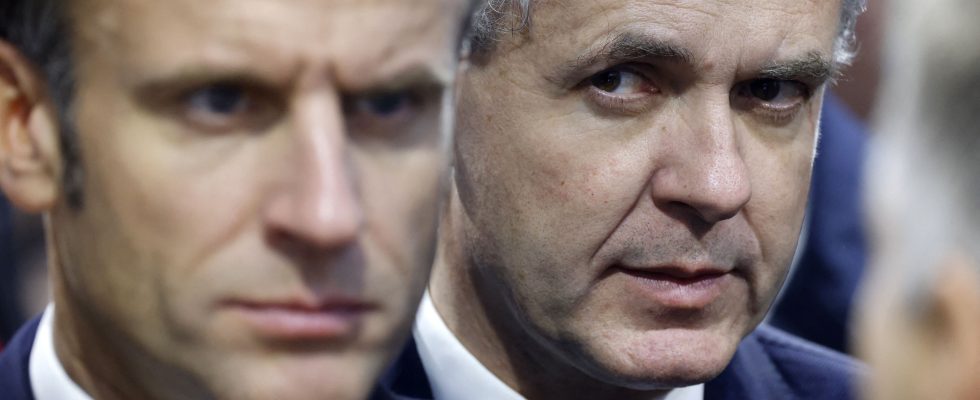Monday morning at the Hôtel de Roquelaure, we will talk about sheet metal hypermarkets, Chaussea type stores and other huge free parking lots. For his political return, Christophe Béchu, the Minister for Ecological Transition and Territorial Cohesion – accompanied by Olivia Grégoire, the Minister Delegate for Small and Medium-Sized Enterprises – has chosen his theme. Launch a commercial zone transformation program. “There is a triple challenge: ecological first, because they are thermal colanders. Economic then. Social, too: we must develop ‘ugly France’, because people want to find greener spaces”, we explain in the entourage of the minister. On the menu: the revitalization of these shops, the construction of housing, the development of green spaces and why not the installation of public services! An experiment at 24 million euros, considered urgent since it has been integrated into the green industry bill, discussed in a joint committee next October.
“Anti-boo-boo guarantee”
Some of the majority deputies ardently support the initiative. In a column published last Thursday in Le Figaro, the president of the Economic Affairs Committee Guillaume Kasbarian, deputy for Eure-et-Loir – a department in which these commercial zones are numerous and essential for residents, including those who live in the city center – took the pen to defend “this other face of France”. The 140 Renaissance-Modem-Horizons parliamentarians and local elected officials who signed the forum call for “rethinking these spaces […] become essential in the daily lives of the French”, rather than “stigmatizing” them.
Put these commercial zones back at the heart of public debate? Above all, do not see in this an appeal to the middle and working classes by Macronie, sweeping Christophe Béchu’s entourage. The initiative may yet lend to think so, while for several weeks, some ministers – like Gérald Darmanin – have multiplied the calls for lighthouses aimed at this segment of the population. At the delegated Ministry of SMEs, however, the discourse is much more assertive. “Through this plan, we are targeting peripheral France. The France of the yellow vests, among others, who gathered in the parking lots of Leclerc supermarkets,” says a close friend of Olivia Grégoire. Not out of opportunism, no. According to her advisor, “the minister has always listened to these concerns”.
The minister perhaps, but can we say the same about the president? In 2020, Emmanuel Macron had split a lyrical and quite critical outing against commercial areas: “Stopping concrete is a project to make our country more human, basically more beautiful”, and to find businesses city center and put an end to urban sprawl, he insisted. “It’s a model that our fellow citizens want to get away from.” Emmanuel Macron would he have changed his mind? The new project “is a counterbalance to Action Cœur de Ville (an action program launched from 2018 to 2022 to revitalize the centers of medium-sized cities), a kind of ‘at the same time’ Macronian to fire on the outskirts and give an anti-bobo guarantee”, analyzes Olivier Chadoin, specialist in the sociology of architects and professor at the University of Bordeaux.
Political unthought
Because at the heart of the yellow vest crisis, it was often on the roundabouts of these areas that the demonstrators planted their pickets. The current Renaissance deputy for Moselle, Ludovic Mendes, still remembers a confrontation in the parking lot of the Saint-Maclou sign, in the commercial area of Augny. “The gendarmerie asked me to leave after twenty minutes, because it was too dangerous for me.” If they are obviously not the only or majority customers, the yellow vests have drawn attention to these commercial areas, frequented by very diverse populations.
Emblems of this France of city entrances, they are part of these ambiguous places in the national landscape. Long reviled by part of the political class because of their consequences on the desertification of city centers, they have also been decried by aesthetes of all kinds, qualified – with a touch of contempt – as a major symbol of “France ugly”. They are also the symbol of an unthought of politics, leading to their archaic development since the first constructions, in the 1960s, where it is easy to fantasize sociological considerations. “There is an imagination, obviously: quickly, we can think that commercial zones, outskirts and yellow vests go together,” analyzes Olivier Chadoin. The reality is more complex: 72% of in-store purchases are made there. In the opposition, we do not fail to point out that the maneuver is a bit big. “I doubt that it is through the commercial zones that we speak to peripheral France… It’s really reductive, and almost insulting, fumes Julien Dive, deputy of Les Républicains de l’Aisne. Between the sausage and beer political return of Gérald Darmanin, and that of commercial zones, the government is playing on commonplaces disconnected from the main issues.”
The France of Nicolas Mathieu
The project is above all proof of yet another attempt to change the narrative at the top of the State. “Emmanuel Macron was perceived as the candidate of the elites and city centers with somewhat unfortunate statements on residential areas, analyzes a close friend of the president. We are now turning to a more rural and peripheral France.” For in recent years, realities passed over in silence have emerged in the media, being the subject of artistic or political demonstrations. “Nicolas Mathieu, Jérôme Fourquet or even Orelsan have contributed to this highlighting. Without forgetting the movement of yellow vests which has been an accelerator of the government’s awareness”, continues the same.
An analysis to which Bruno Cautres, researcher at the National Center for Scientific Research (CNRS), subscribes. “The yellow vests crisis led to the amendment of the initial project: the executive now multiplies the references to everyday life. To speak of the renovation of commercial areas is to speak of a France that it has lost , partly that of Marine Le Pen.” But after more than six years in power, isn’t it a little late to become the president of the middle classes?
